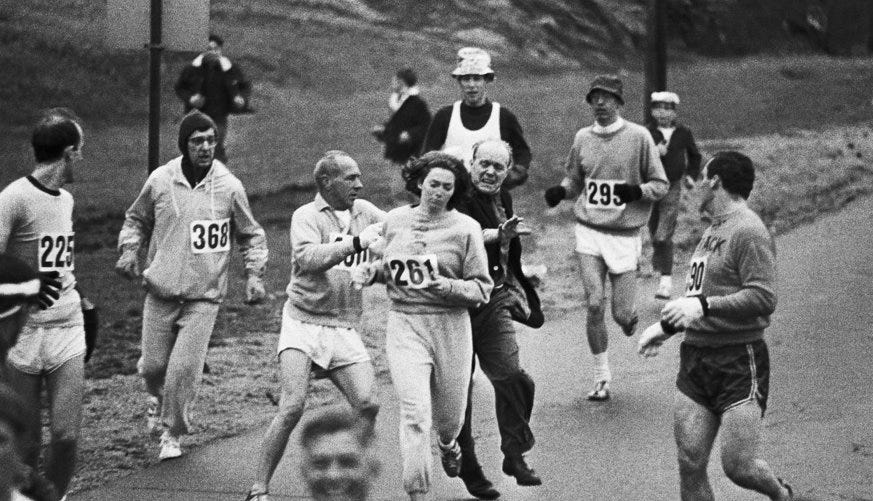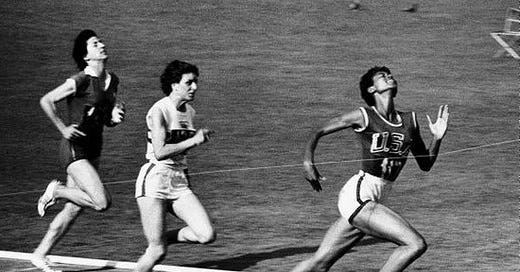International Women’s Day: Five women who changed the world of running
We look at the stories of some of the most incredible and inspiring women runners and wheelchair racers.
From a 100 metre Olympic champion who wasn’t supposed to be able to walk to a woman who has run more marathons and ultras than any other, Running Tales is today celebrating five of the most incredible and inspiring women in the world of running and wheelchair racing.
On International Women’s Day, we take a look at the stories of Kathrine Switzer, Jasmin Paris, Jean Altomari, Sigrid Eichner and Wilma Rudolph.
Kathrine Switzer - The first woman to officially run the Boston Marathon

In 1967, Kathrine Switzer became the first woman to run the Boston Marathon as an officially registered competitor.
Although the official rules for the marathon did not mention gender, it was widely accepted women were prohibited from running in official competitions.
A year previously, another incredible female athlete, Bobbi Gibb, had paved the way for Switzer by completing the race after joining it unobserved. She had been prevented from running it and told women were physiologically incapable of running 26 miles.
Gibb, though, wore no runner's bib and was not an official entrant.
The following year, Switzer registered officially and paid the full entry fee - before having a male runner collect her bib.
Wearing a hoodie to cover her long hair, she set out with members of her running group. When her hood slipped off she was spotted by marathon organiser, Jock Semple.



Semple raced on to the course and tried to rip Switzer’s bib from her top, only being prevented from doing so by her American Football playing boyfriend Tom Millar.
Switzer went on to finish the marathon in four hours 20 minutes - although it took until 1972 for the Boston Marathon to establish an official women’s race.
Jasmin Paris - Conquering Britain’s most brutal race and beating the men


In 2019, British fell runner Jasmin Paris became the first woman to win the Spine Race, a 268-mile run across the Pennine Way in the UK during the winter.
Not only that, but her time of 83 hours and 12 minutes smashed the previous record time - set by male runner Eoin Keith - by more than 12 hours.
It is a record she still holds today, although last year’s winner Damian Hall got closer when he finished in 84 hours and 36 minutes.


In March last year, Paris took part in the iconic Barkley Marathons in Tennessee, completing three loops - known as a ‘Fun Run’ - of the course. It was the first time for nine years that a woman had done so.
Jean Altomari - The first self-propelled wheelchair athlete to complete Comrades
South Africa’s Comrades Marathon, a 89-kilometres ultra run annually between the cities of Durban and Pietermaritzburg, calls itself ‘The Ultimate Human Race’.


Up until 2016, it had a strict policy of not allowing wheelchair athletes to compete. That year, after months of deliberations with race officials, two women - Chaeli Mycroft and Anita Engelbrecht - became the first wheelchair athletes to complete the event.
The pair competed with running partners and both finished in under 11 hours.
After seeing their story, Jean Marie Altomari - a Pennsylvania State Trooper who had been left paralysed from the waist down when she suffered a spinal-cord injury in 2010 - was determined to take on the race herself.
She battled with officials for months to confirm her entry and eventually persuaded Athletics South Africa to update its rules to state no athlete can be denied entry to events it endorses.
Altomari completed the race in ten hours and 16 minutes, leading the Comrades Marathon Association’s chairperson, Sifiso Nzuza, to praise her “determination, courage and endurance”.
Her efforts paved the way for British wheelchair athlete, Claudia Burrough, to take on Comrades in 2022.

Sigrid Eichner - The woman who has run more marathons/ultras than any other
German endurance runner Sigrid Eichner has taken running to extremes few others can even dream of.
The now 82-year-old has, according to the Mega Marathons List which she sits in fourth place on, completed 2,313 marathons/ultras.
The lists’ members “represent a mere 0.0000000427% of the people on this planet,” while more people have orbited the earth in outer space and more climbers have summited Mount Everest than the number of people who have completed the 300 marathons/ultras needed to feature on it.


In an article detailing Eichner’s achievements, Canadian Running said the Berlin marathoner’s running career did not begin until she was in her 40s, and that she started running “to take time for herself and escape domestic life”.
Eichner told DW Stories that, for her, running is about the “priceless” feeling of being able to do something and leave something behind.
Wilma Rudolph - From polio and scarlet fever to gold medal Olympian and civil rights champion
As a child, Wilma Rudolph was told she would never walk again having survived bouts of polio and scarlet fever.


Her illness forced her to wear a brace on her leg, but by the age of 11 she had started to play basketball outside - a move which unleashed a love of sport that would lead all the way to Olympic success.
In 1956, she won bronze as part of the US 4x100 relay team, but it was in Rome in 1960 that Rudolph became “the fastest woman in the world.”
She won three gold medals - the first American woman to do so at the same Games - and broke as many world records.
Rudolph’s inspirational behaviour wasn’t confined to the track though. Returning home as an Olympic champion, she refused to attend her homecoming parade if it was not integrated.
Her home town of Clarksville eventually honoured Rudolph’s victories in the city’s first-ever integrated event.
When she retired at the age of just 22, she became a school teacher and spent the rest of her life protesting and fighting to end segregation laws.
Which women have inspired you to run? Whether they are an Olympian, ultra marathoner or someone at your local parkrun we want to hear you stories in the comments section below
Thanks as ever for reading and listening to Running Tales. We couldn’t do this without your support - please back us to keep going by…




